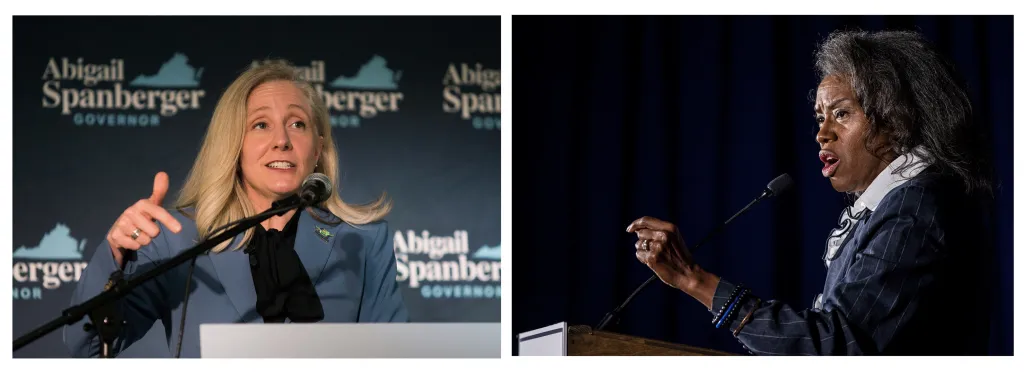
For a high-stakes affair, the race to be the next governor of Virginia has been remarkably staid. Polls have shown Democratic candidate and former U.S. Rep. Abigail Spanberger with a sizable lead over Republican candidate and Lt. Gov. Winsome Earle-Sears as the two have criss-crossed the commonwealth stumping for votes.
Tonight the two face off in their only face-to-face debate, taking place at Norfolk State University, less than a month before Election Day. This will be one of the last times voters will hear from the candidates themselves, and it’s an important opportunity for those who haven’t yet cast a ballot to size the two up and decide who should lead Virginia for the next four years.
Whatever the result in November, Virginia will make history this year when it elects its first female governor nearly 250 years after ratifying its first state constitution in 1776. Either Spanberger or Earle-Sears will join a distinguished list that includes Founding Fathers and revered statesmen Thomas Jefferson, Patrick Henry and James Monroe.
Incumbent Gov. Glenn Youngkin is limited by the current state constitution to one term in office and, like those who preceded him, can attest to how quickly those four years pass. It’s crucial that Virginia’s executive hit the ground running come January or risk exiting office in 2030 with a list of unfinished goals and initiatives that failed to launch.
Debates can be unpredictable, but viewers should hope that the Thursday night event provides ample opportunity for the candidates to spell out with specifics their vision for a potential term in office.
Expect the Trump administration to be central to that discussion. Virginia, with its large number of federal employees, robust military population and bustling port, is among the states most harmed by White House policies. The debate will take place with the federal government shutdown, and House Speaker Mike Johnson said Tuesday that workers may not receive back pay for the time they are furloughed.
But while Washington does exert considerable influence over the commonwealth, the governor’s race must also be about state decisions and state policies, including how to meet a growing energy demand, how to protect coastal communities from climate change, how to strengthen our secondary and higher education, how to address the need for affordable housing, how to expand our employment base and bring more good paying jobs to Virginia, and how to chart a course forward on health care in light of federal policies that threaten coverage for hundreds of thousands of commonwealth residents.
That’s not an exhaustive list and the next governor will have a full inbox waiting on her desk when she comes to Richmond in January. Virginians are right to expect that those seeking to win that office will have her priorities spelled out and detailed plans about how to tackle them.
Thursday’s debate should help provide some answers. And Hampton Roads is fortunate to be the host, with the event happening at the L. Douglas Wilder Performing Arts Center at NSU beginning at 7 p.m. It will be broadcast locally on WAVY TV-10 and carried by affiliates across the commonwealth.
Voters have already cast nearly 400,000 ballots, according to the Virginia Public Access Project. Expect that number to rise quickly as more early voting locations open leading up to Election Day.
Both candidates have compelling personal stories. Spanberger is a former CIA officer who served three terms in the U.S. House, and Earle-Sears is a Jamaican immigrant who served in the U.S. Marines before winning election four years ago to Virginia’s second-highest office.
Though it may be stodgy to say, this race should be about policies, not personalities, and what a future Virginia will look like under either Earle-Sears or Spanberger.
Commonwealth voters should enjoy this opportunity to hear from both women, and hope the debate remains focused on the issues that will shape Virginia in the next four years. Those planning to cast a ballot this year should make sure to tune in.